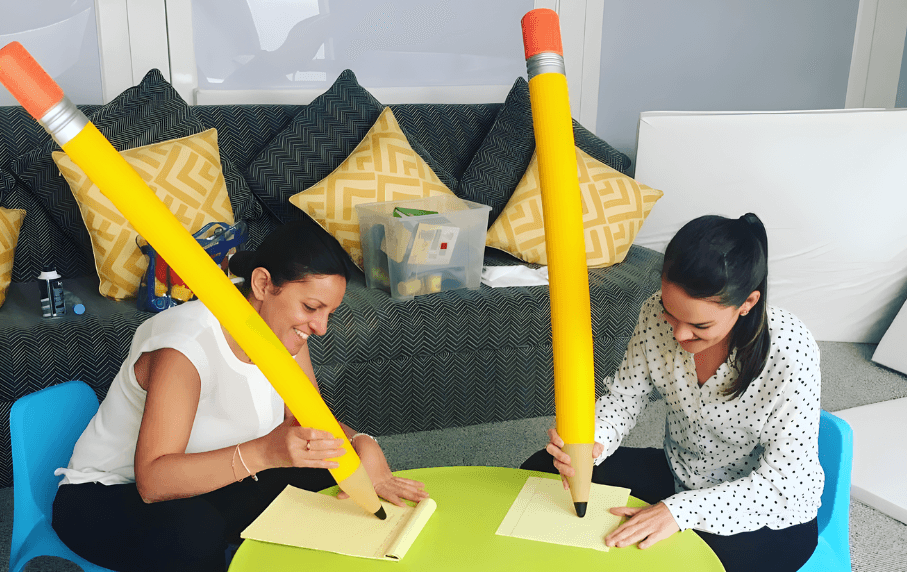While language and auditory processing deficits can affect the ability to learn language, they can also hinder your child’s ability to understand abstract concepts and to master the problem solving skills conveyed when teaching math concepts. Children with special needs may have receptive or expressive language problems that can substantially affect their learning and ability to express what they do not understand, or to show how they solved problems.
Words and phrases we use every day, will have very different meanings when it comes to numbers and mathematical operations. When you say to your child, “I’m just in the middle of something,” you mean you are busy, but your child will later need to understand that the concept middle means equidistant or halfway. Instructions such as draw a line down the middle of your page will be commonly heard in the primary years.
Many children with language difficulties can do the simple computation when presented with the numbers 5+2=?, but it is concepts such as more, less, fewer, bigger, smaller, all together, etc. that can be difficult. A child may be able to rote count from 1-1000 but, if you ask the child to give you two blocks or show you how many blocks they need to make 9, they may struggle. With intervention at school and support during everyday activities at home, these math concepts can be more easily understood.
Below is a fairly comprehensive list of the steps on which you should focus to help children with special needs develop math skills, from the folks at PBS Parents (PBS.org).
- Maintain consistency and communication across school and home settings – Parents, caregivers, tutors, and classroom teachers should coordinate and use the same instructional approach.
- Teach basic concepts using concrete objects – For example, let children explore number concepts by counting the legs of a chair to find the number four or by subtracting crayons from a box. The progression from understanding concrete materials, pictorial representations, and abstract number representations may take some children longer than others.
- Provide specialized materials – To help children organize their calculations, have them use graph paper (or lined paper turned sideways) to keep numbers in columns. Encourage the use of scrap paper to keep work neat, highlighters to underline key words and numbers, and manipulatives such as base-ten blocks or fraction bars.
- Make your expectations explicit – Tell children the procedures you would like them to use when solving a problem, model each procedure for them, then have them tell you what they are expected to do. Some students benefit by having a math notebook filled with examples of completed problems to which they can refer if they become overwhelmed or confused.
- Provide time for checking work – Emphasize that completing math assignments is a process, encourage children to become comfortable reviewing their work, making changes, or asking questions when they are unsure of their answers.
Teaching Practical, Real-world Math Skills
Many children, especially those with special needs, will benefit from learning how their newly developed skills with math and problem solving will help them in real-life situations. Practical examples from their daily lives may reach them on a deeper, more intuitive level, helping them to turn abstract concepts into a concrete learning experience.
- Give children opportunities to connect mathematical concepts to familiar situations – For example, when introducing measurement concepts, have children estimate their measurements before measuring classmates’ and family members’ heights or weighing their book bags when empty and when full.
- Help children apply math concepts to new situations – For example, show them how to use percentages to understand the price of a pair of shoes on sale at the mall or the amount of their allowance they spend on snacks.
- Provide access to programs or tutors that can help a child improve his or her math skills – Tutors can assist children with weak math sub-skills, such as multiplication and division. Provide tutors during summer months or after school to boost performance and ensure that the child retains his or her skills.
- Help children keep track of problematic areas – When doing math homework, children may benefit from having their most common errors listed on flashcards. They can then refer to the cards while completing their assignments.
- Play math games – To encourage automaticity with math facts, students may benefit from playing math games (e. g., dice, playing cards) and listening to commercially available audiotapes that provide a fun way of learning math facts.
Obviously, collaborating with teachers and their assistants will greatly help children with special needs learn more effectively. Try to visit your child’s school regularly to ask how you can support and reinforce the way they are teaching math concepts to your child.
